Humanities & Social Sciences
Prof. Josephine Ahikire Hands Over CHUSS Leadership to Assoc. Prof. Helen Nkabala
Published
2 years agoon
By
Jane Anyango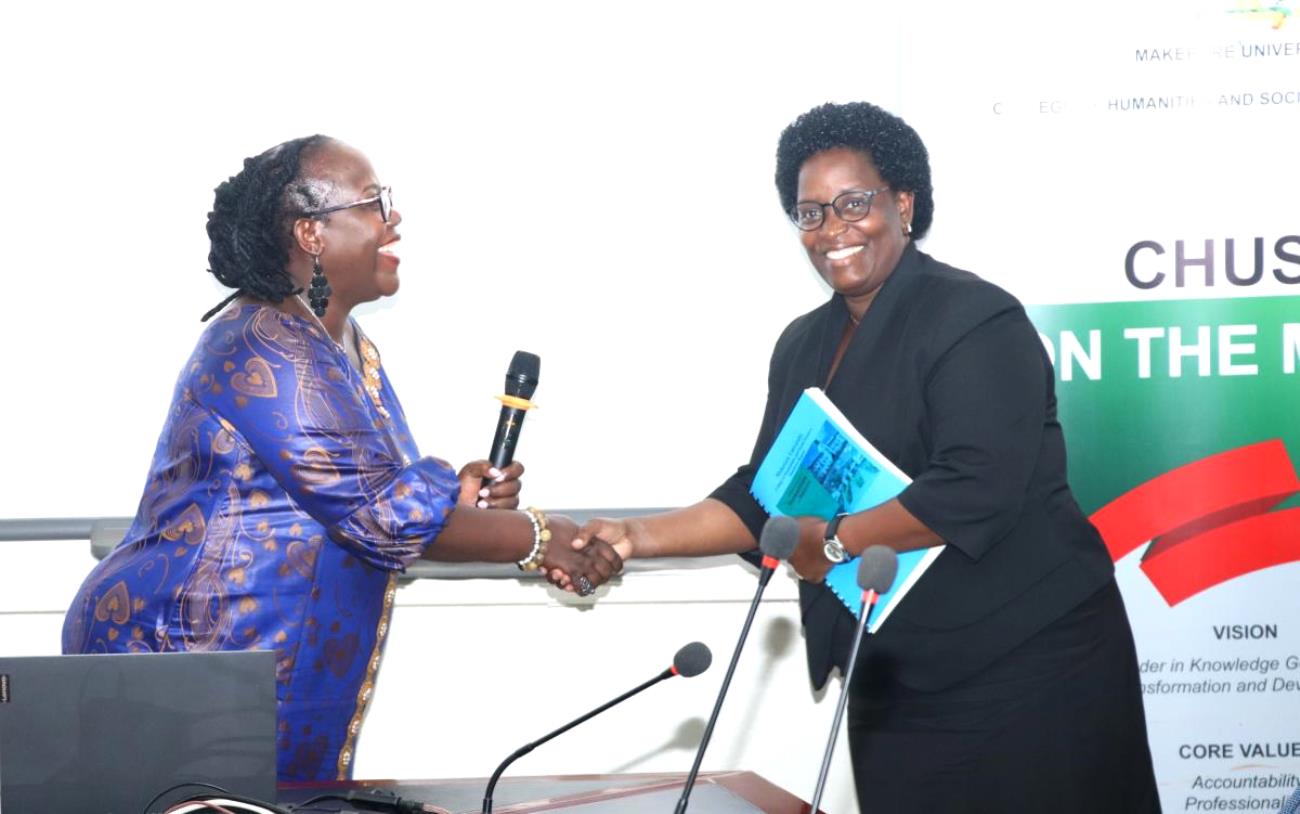
“As outgoing Principal of the biggest college, the most vibrant college, the college with the power of the word, the college with the power of language, the college with the power of vibe, I hereby hand over to you Professor Helen Nkabala Nabalirwa..”
“I extend my congratulations to Prof. Helen Nkabala, the incoming Principal and I pledge full support in her new position, so that at CHUSS, we remain on the move”.
That was Prof. Josephine Ahikire message as she handed over the instruments of power to the newly elected Principal for the College of Humanities and Social Sciences (CHUSS) Assoc. Prof. Helen Nambalirwa Nkabala on Friday 31st May 2024. Nkabala pledged participatory leadership and assured attendees that CHUSS will continue to excel.
The afternoon handover over ceremony held in the College Smart room was witnessed by the University Secretary and Director Human Resources represented. Prof. Nkabala’s family (mother, uncle and sister, her spouse Mr. Nkabala) witnessed the occasion. The Principal College of Natural Sciences Prof. Ireeta Tumps, Head GAMSU Prof. Sylvia Nanyonga Tamusuza, staff from Makerere University staff tribunal, Prof. Amanda from CEDAT, also graced the occasion. Members of CHUSS management and staff including Deputy Principal Dr. Eric Awich, Deans, Heads of departments, coordinators, support and administrative staff attended the ceremony.
I have enjoyed my tenure says outgoing Prof Josephine Ahikire
Prof. Josephine Ahikire said, CHUSS has created a cohort of leaders especially women to take it on.
“I have truly enjoyed my tenure as Principal and I send my appreciation to my Deputy Principal Assoc. Prof. Eric Awich, the Deans and heads. We delivered as a team right from the top to the last person. Now that public universities are being run as government departments Prof. Ahikire called for collaborative spirit from all administrators, college and schools and departments to be able to deliver” .
Ahikire paid special recognition to Makerere University top management for their unwavering support and for creating enabling environment for members of CHUSS to deliver what they pursue as their mantra, CHUSS on the Move.
“ I learnt one thing from the current Vice Chancellor that not all people need to line up to have a document signed. So, I removed some of those benches from the Principals corridor. Not all people have to sit and wait for a travel form to be signed”, she said.
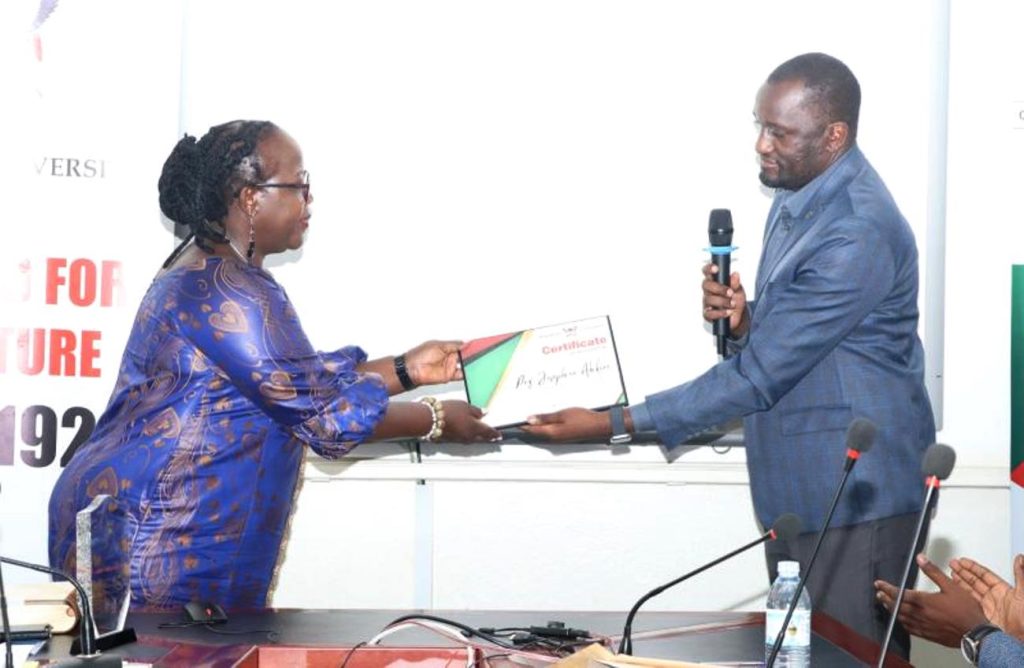
She also extended gratitude to the donors who have supported the college especially those supposedly unmarketable fields around the humanities and social sciences. She noted that as the rest of the donors pursue the marketable fields along the neoliberal agenda, the soul of humanity is falling apart. She pointed out the Mellon Foundation and the Gerda Henkel Siftung for being at the fore front and whose funds have been used to create vibrancy at CHUSS.
Giving an overview of her hand over report, Ahikire said the role of the Principal is guided by the Universities and Tertiary Institutions Act and the College statute whose functions are stipulated in there. CHUSS, she said, is one of the biggest units of the university offering the oldest disciplines which provide the key for unlocking the human potential for development.
In the report, the Professor highlighted human resources status in the college comprising 11 prof. 26 associate professors 44 senior lecturers, 87 lecturers and 70 Assist lectures, 26 administrative staff and 52 support staff noting that, the college was still bottom heavy with more assistant lecturers than lecturers.
The report also indicated the college assets in terms of office equipment, furniture and computers mostly acquired through projects, subvention development fund or furniture and fittings.
The report further highlighted the college wide projects in terms of how they operate through the Principals office, stores and assets register, the budget performance, ledger for each project, the project balances and the cohorts of PhD training.
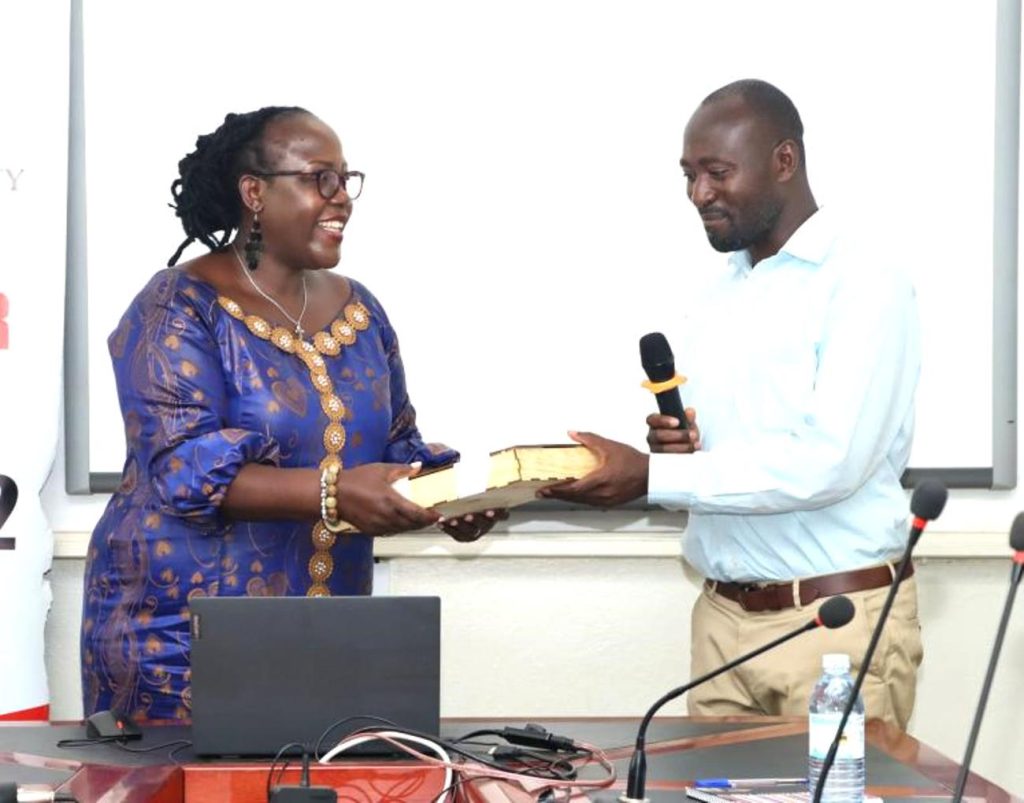
Major accomplishments
Prof. Ahikire reported that in the recent years, the college made progress in terms of staff promotion and most were still in the process . “In the last three years, a total of 87 members have been promoted. Six professors, nine associates, 35 senior lecturers, and 37 lecturers”.
She said, the college has one of the biggest student population in the university adding that, there has been improvement in terms of graduate output. .
“In the last graduation, we had 30 PhDs. I have put the graduation trends, especially for graduate programs, and the fact that we have really improved, means that supervision level has improved, the processing of examination has also improved, and the processing of results has also improved. And that is something that everybody in this room can actually own.”
Notably, she also reported that the college was able to pilot a students’ management system.
“When I came into office, you’d ask this student, what is the progress and you’d never know how to track. So as of now, at the touch of a button, you can know that if this student submitted a thesis or a dissertation, this is where it has reached”, she explained.
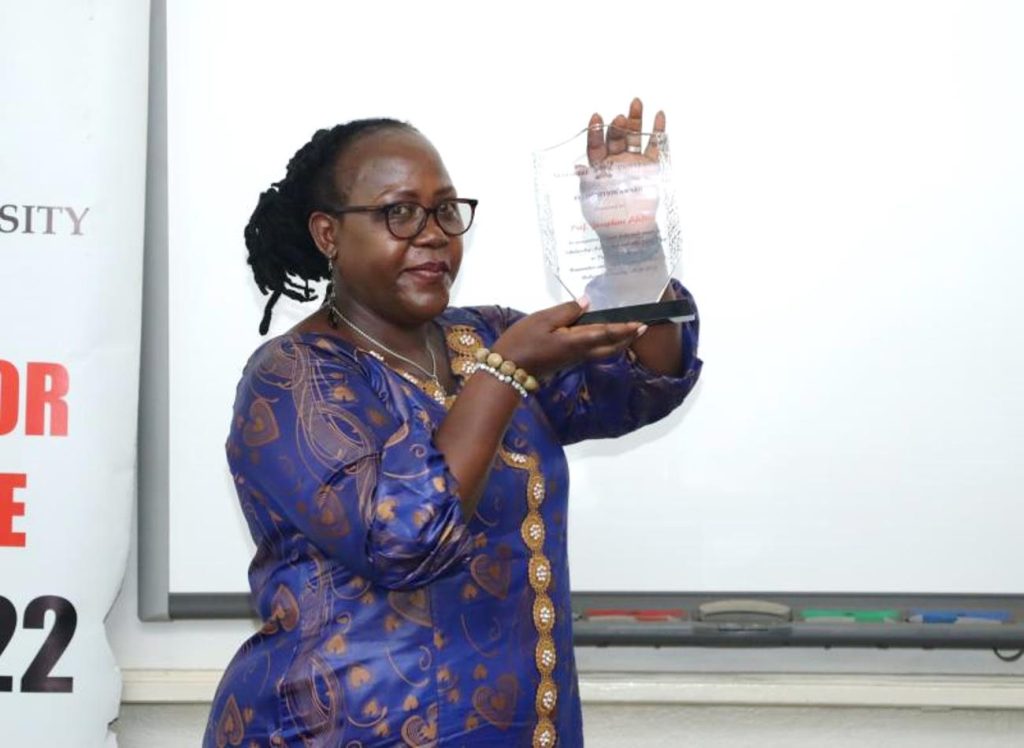
Among the challenges, Prof. Ahikire highlighted the limited teaching and office space, accreditation of courses, limited human and financial resources including grant and research portfolio,
In terms of the issues to consider, Ahikire stressed the need to pursue the research- led agenda and graduate training, and expressed the need for the academic board to be facilitated to serve as a driving force behind CHUSS research agenda. Ahikire called upon staff to first have the research agenda, and then mobilize resources and have Graduate training as a pivotal aspect of research and to continuously upgrade the infrastructure.
Prof. Nkabala hails Predecessor for laying foundation. Assures that CHUSS will Continue to Excel
Assoc. Prof. Nkabala appreciated the outgoing Principal for laying the ground.
“A very good afternoon, friends. It is with a lot of humility that I stand before you this afternoon, taking over what that is already done. I would like thank my predecessor, who has just handed over, Principal Emeritus Professor Josephine Ahikire, Thank you for laying the ground, and thank you for handing over. Friends, I would like to start by acknowledging the core people who make what CHUSS is”. Nkabala aknowlegded.
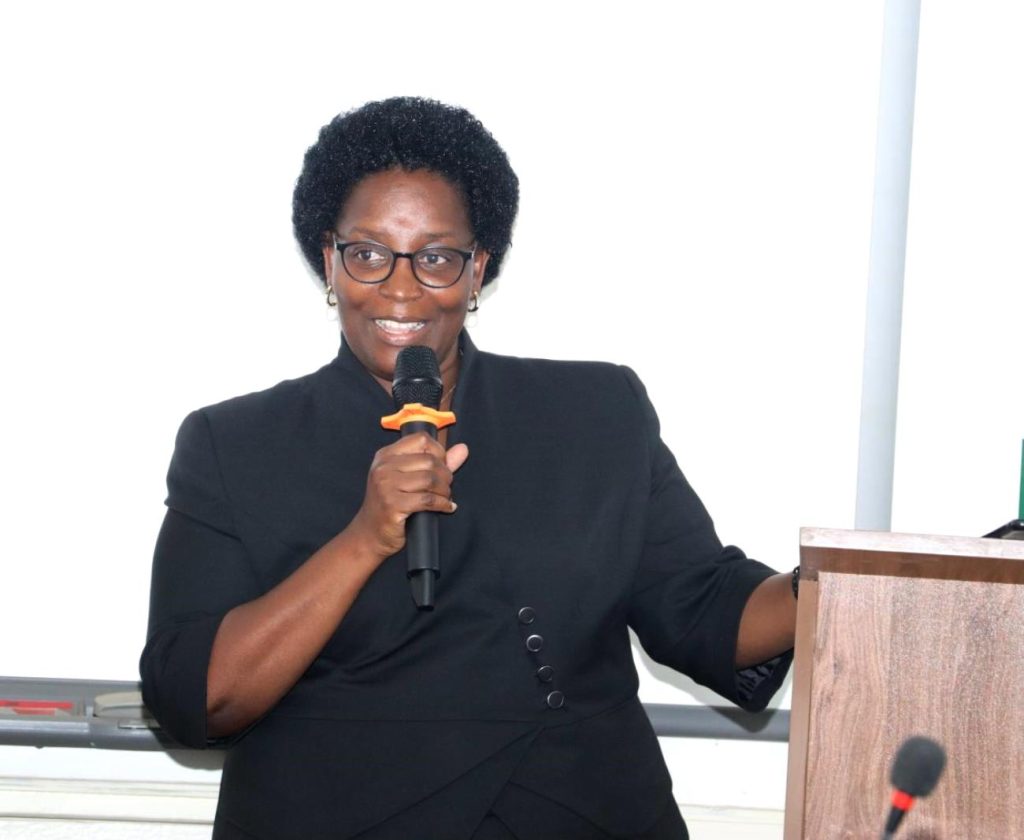
Nkabala also recognized deans, heads, administrative, support and all staff for leading CHUSS to where it is assuring them that college will remain on move.
“ I want to give you my assurance that while I know that change is difficult, I cannot lie to you that there is no change. We have changed and you have seen that. But CHUSS will continue to excel with your support. What we did, is to change the driving seat, but you are the engine”, Prof. Nkabala assured and remarked that she counts on the Professors to offer support and guidance.
“So it is up to us, me and you and Prof. Ahikire as one of the critical Professors and others. I want to pay allegiance and also assure you that for CHUSS to go forward, we are looking up to you to offer academic leadership. So when we come please accept us. You rightly noted that e are bottom heavy, I will continue from where you have stopped and do my best”. Nkabala promised adding:
“I will reach out to all the leaders and I want to assure all the staff in CHUSS, that I will reach to each and every one of you. So, dear deans present, heads of departments, I will request that we have an entry meeting in each and every school and department. We are 16 and we shall talk together to see how we carry on this work that I start today”, she asserted.
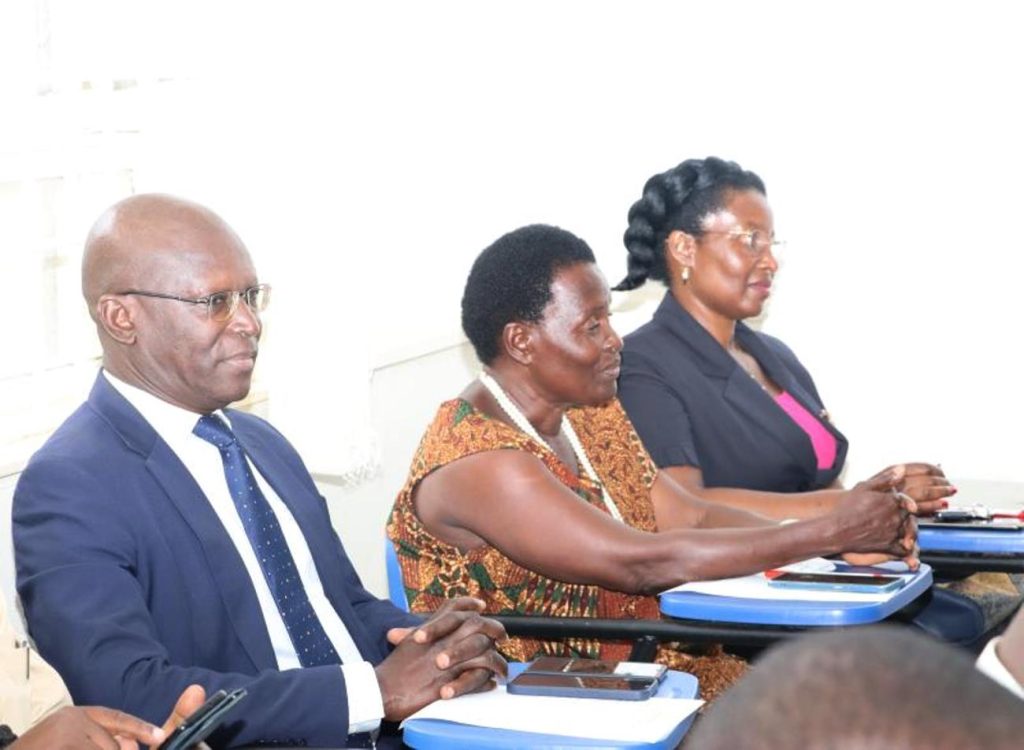
Nkabala also called on the office of the university secretary for support.
“I was excited when I heard the US pledging total support, underline the word total support, because Professor Ahikire said, you give them funds for one course, yes, yet we have 37 programmes. So, when I knock on your door on Tuesday, because Monday is a public holiday, please receive me”
Stating that she hails from a very humble background, Nkabala requested staff to be friends to work together and to see the continuity in a very peaceful way.
University Secretary Recognises Prof. Ahikire for exemplary leadership: Counsels on leadership qualities
Representing the Makerere University Secretary, the Deputy University Secretary Simon Kizito offered reflections on leadership dynamics during the handover ceremony.
The Secretary began by acknowledging the universal truth that despite our religious teachings, we all stumble and make mistakes. Drawing a parallel between these human imperfections and the challenges of leadership, he emphasized the importance of continuous learning and growth.
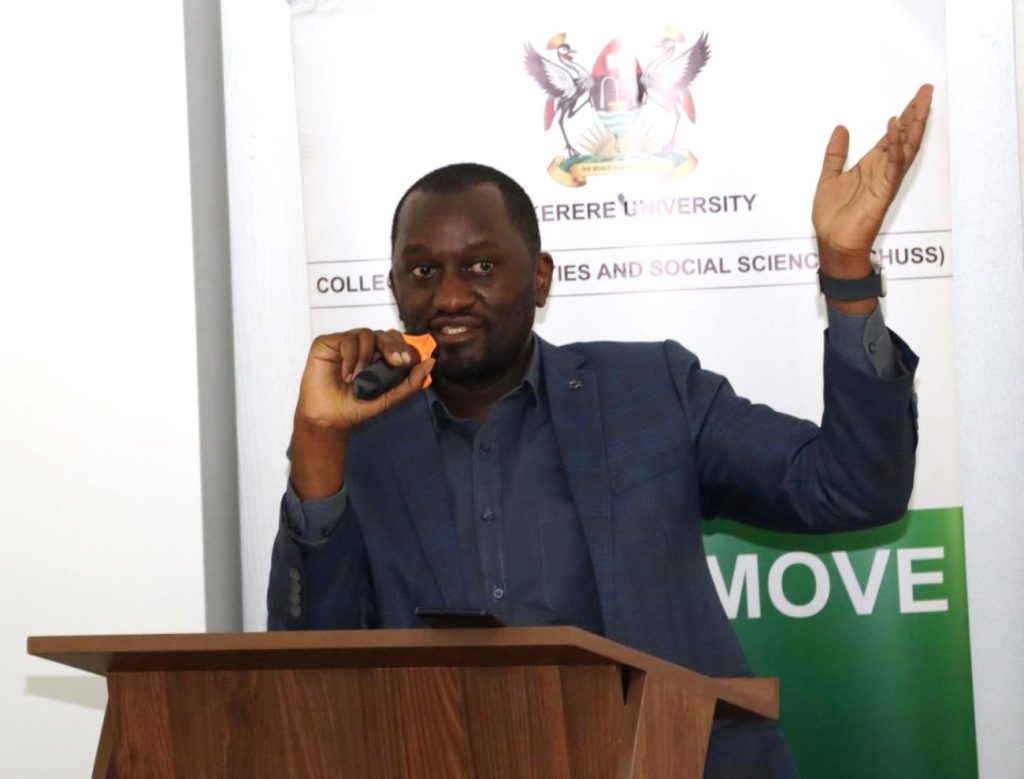
He shared bits of wisdom collected from his own experiences. He spoke of the inevitability of conflict in leadership roles, urging leaders to approach conflicts with a positive mindset, viewing them as opportunities for resolution and growth
With a touch of vulnerability, he opened up about the loneliness that often accompanies leadership positions. “It’s not easy,” he admitted, “to make tough decisions and stand by them.” But he offered reassurance that in the face of solitude, there lies an opportunity for leaders to make a positive impact through their actions.
The University Secretary spoke of failure as a natural part of the leadership journey, urging leaders to embrace setbacks as stepping stones to success. He reminded the audience that time is finite, urging leaders to make the most of their tenure by prioritizing effective time management and delegation.
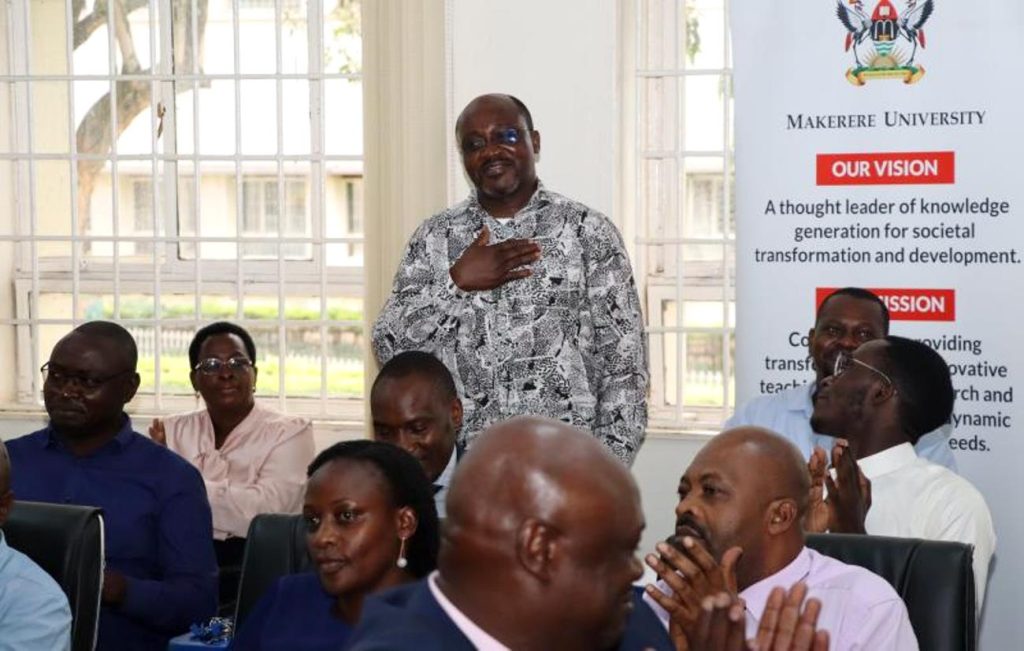
The Secretary emphasized the importance of self-care and the acceptance of feedback in maintaining effective leadership. With genuine warmth, he expressed gratitude for the exemplary leadership of outgoing Principal Ahikire, promising continued support for CHUSS under its new leadership.
He expressed his confidence in the future of CHUSS, reaffirming the collective commitment to excellence and growth at the institution.
Director Human Resource Grateful for Ahikire’s leadership says, Change is Inevitable
Represented by Makubuya Godfrey, the Director Human Resource Makerere University guided on the need to appreciate that change is inevitable.
“In a leadership, things happen for a cause. And once they do, then the leaders have to accept because God is in between whatever is happening, either for or against. So as this has happened, that change is coming and we are glad it’s coming, you know, we know at a given time it will happen”,
The Director appreciated Professor Ahikire for her service to the university.
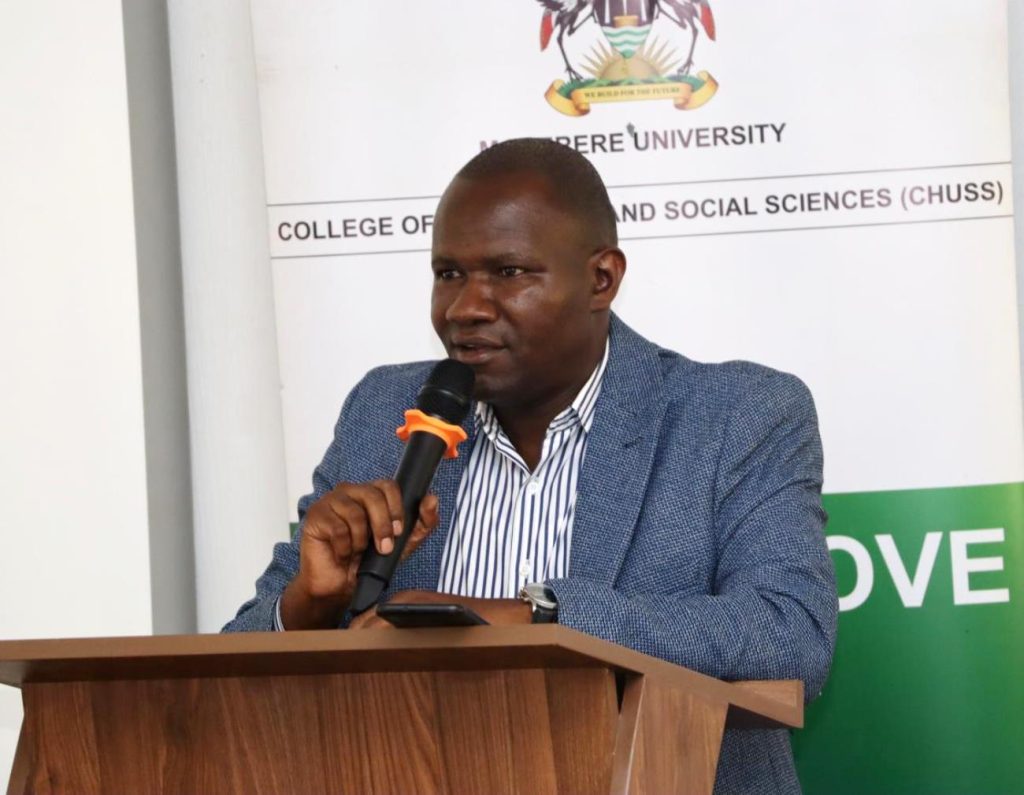
“She has served us for quite some time. And we are very grateful for that leadership. You know, she served even before a deputy principal, acted as Principal and became principal. We are grateful that God provided you that opportunity to offer yourself and the leaders at the time. So, an opportunity is now here that she has to hand over to another leader”. he noted.
As an outgoing principal, Makubuya believed many of the staff had interacted with Prof. Ahikire at different levels and shared a lot.
“And, Professor Nkabala, we welcome you to this college. Of course, it’s not new to you, but in leadership of the college. And it’s our pledge that actually we will work with you to take the college and our university in the right direction”. He added
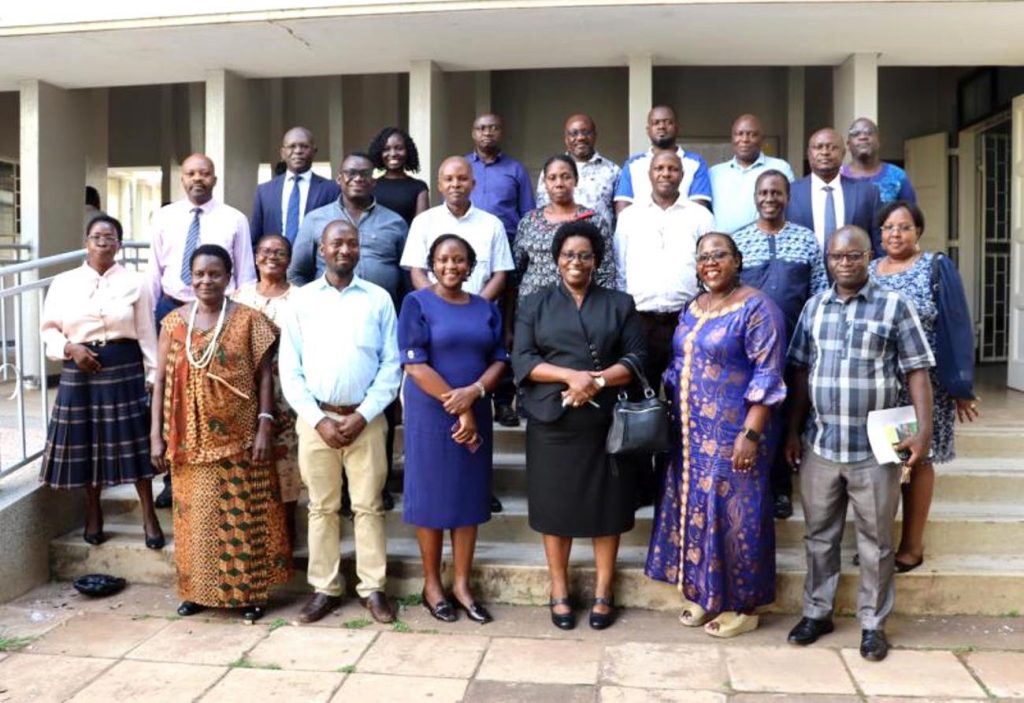
You may like
-
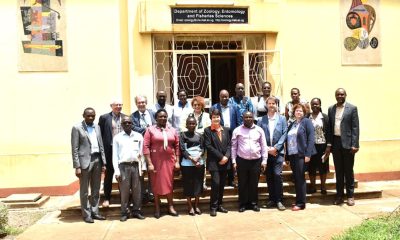

BOKU University Charts New Collaboration Strategies with Mak’s Department of Zoology, Entomology & Fisheries Sciences
-


For Youth by Youth – Call for Second Cohort Applications
-


Dr. Samalie Namukose and the Quiet Work of Making Nutrition Count
-


Press Statement: Makerere University Congratulates Former Staff and Students on Successful Election to Public Office
-
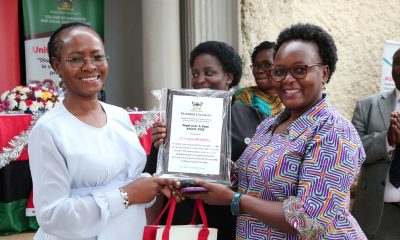

Dr. Pamela Khanakwa Honored for Steering Record 18 PhD Candidates for the Mak 2026 Graduation
-
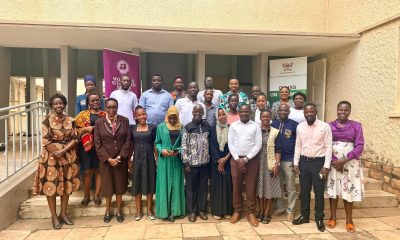

Ugandan Journalists Trained on Peace and Gender-Sensitive Reporting Ahead of 2026 Elections
Humanities & Social Sciences
Dr. Pamela Khanakwa Honored for Steering Record 18 PhD Candidates for the Mak 2026 Graduation
Published
4 weeks agoon
January 23, 2026By
Jane Anyango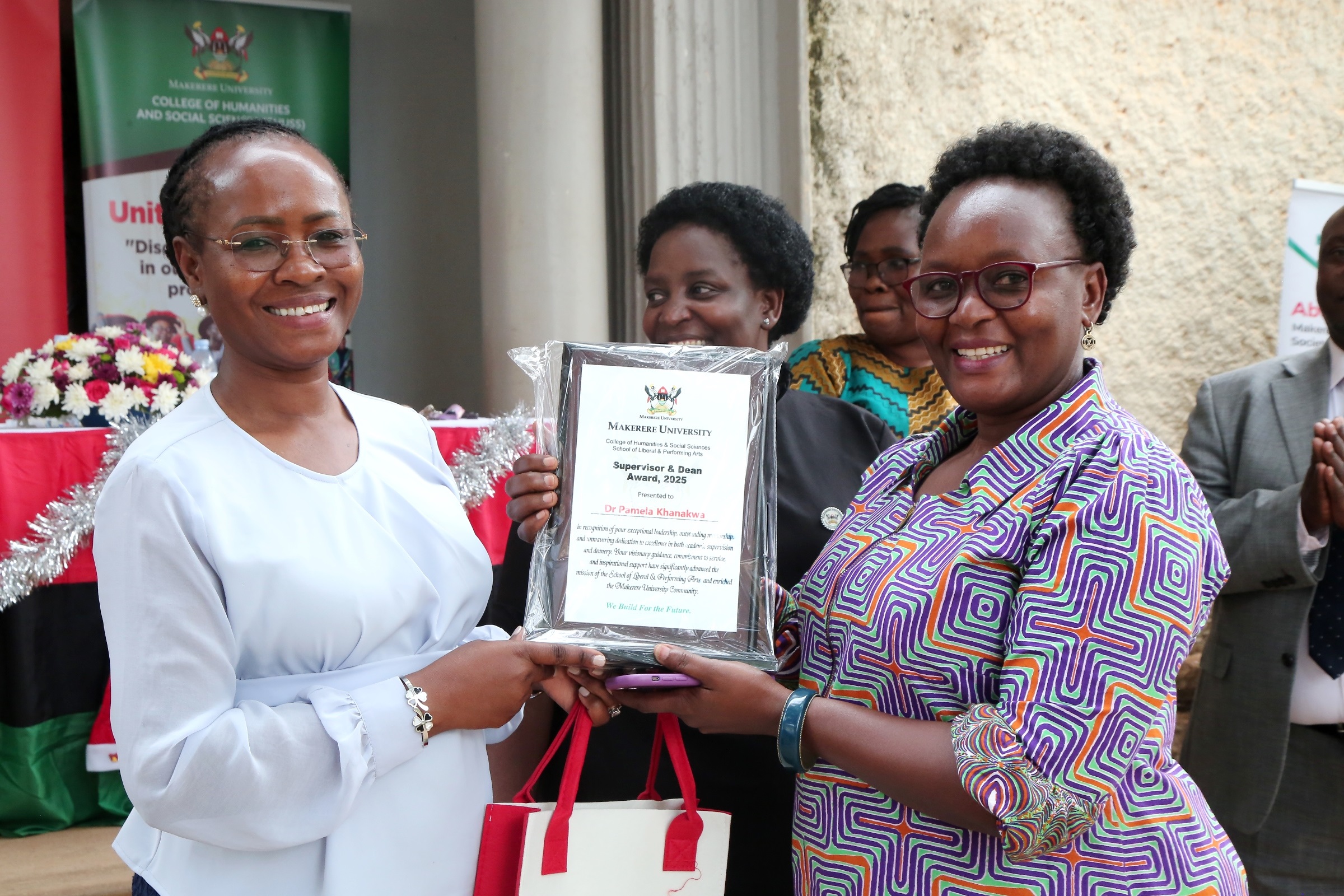
Six personally supervised, three completed in record time, as School of Liberal and Performing Arts sets a historic milestone. Dr. Pamela Khanakwa got the Award as Best PhD Supervisor and Dean
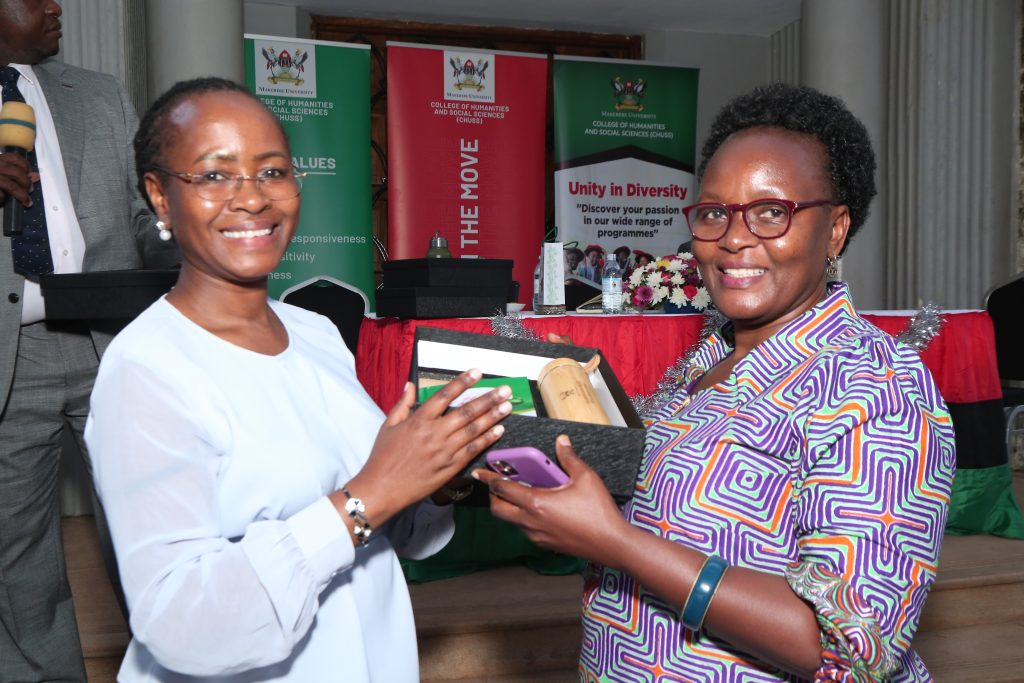
A Historic Academic Milestone for SLPA
The College of Humanities and Social Sciences (CHUSS) recognised the Dean of the School of Liberal and Performing Arts (SLPA), Dr. Pamela Khanakwa, for outstanding academic leadership that has seen the School field 18 PhD candidates for the next 2026 Makerere University Graduation Ceremony scheduled for 24th-27th February. Remarkably, six of these doctoral graduates were directly supervised by Dr. Khanakwa, with three completing within the official three-year timeframe, an exceptional achievement in graduate training. The recognition was announced during the CHUSS End-of-Year Get-Together, where staff applauded Dr. Khanakwa’s dedication, humility, and relentless commitment to postgraduate supervision and timely completion.
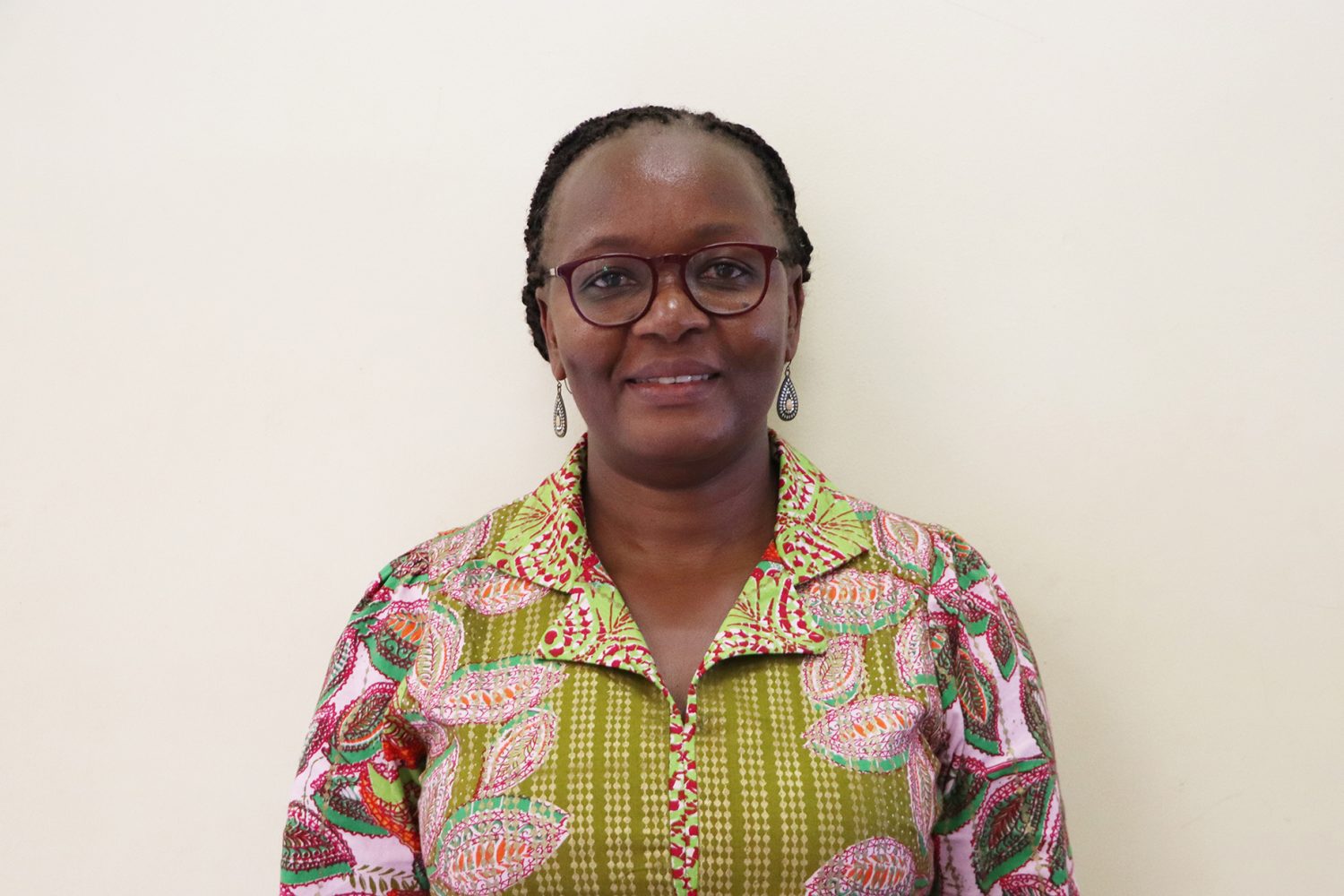
Message to Academic Staff
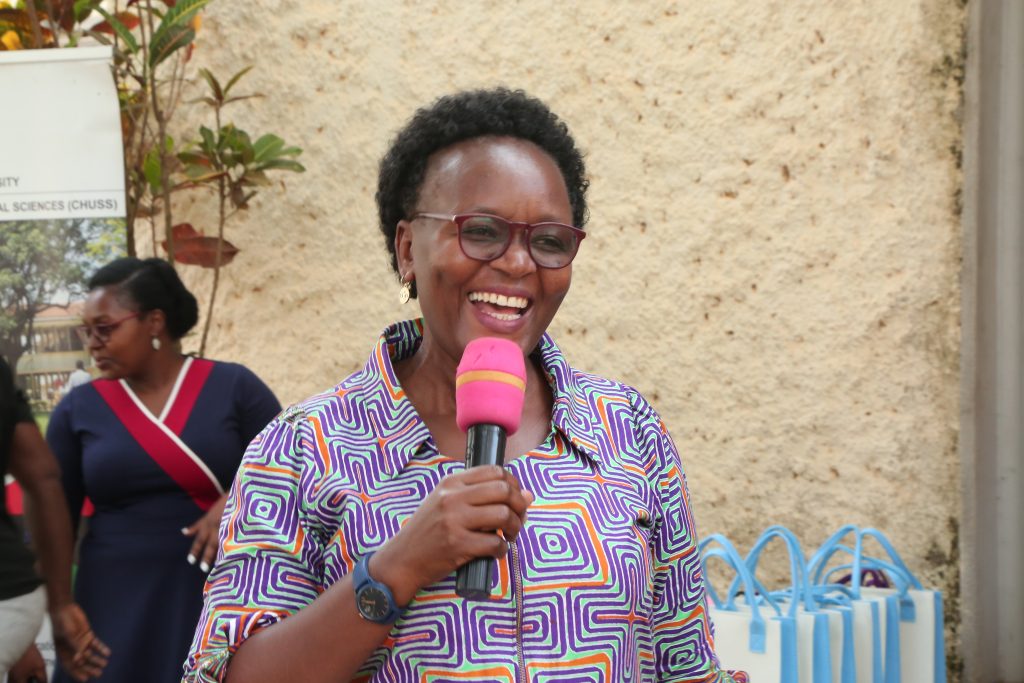
Q: What message do you have for your staff following this achievement?
Dr. Khanakwa:
First, I celebrate my staff and thank them for their dedication to supervision and student support. Academic work is demanding, and material rewards are often limited, but the true satisfaction comes from seeing students succeed.
I encourage my colleagues to remain committed. Yes, the workload is heavy, but many things are possible with dedication and teamwork. Let us continue working for the good of our students, our School, and Makerere University.
Leadership Rooted in Humility
Q: Many colleagues describe you as humble, down to earth, and hardworking. What shapes this character?
Dr. Khanakwa:
I think it is largely my upbringing. My mother was a primary school teacher from the 1950s until the mid-1980s. She worked extremely hard to raise us, combining teaching with farming to ensure we had school fees and basic needs. From her, I learned humility, discipline, and the value of hard work.
I also learned that leadership positions are temporary. You occupy them today, and tomorrow you move on. So humility is essential.
My graduate training also shaped me significantly. My PhD supervisor emphasized that graduate study is a full-time job and that results matter more than noise. Let people see your work through outcomes, not announcements.
Supervision as a Two-Way Commitment
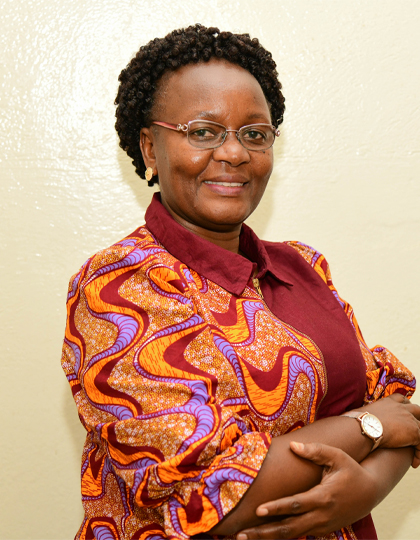
Q: How would you describe your supervision style?
Dr. Khanakwa:
I read my students’ work thoroughly, word by word. Sometimes my comments are tough, but they are honest. Supervision is a two-way commitment. I give feedback, but students must also respond and remain engaged. When that relationship works, progress happens.
Balancing Leadership, Scholarship, and Family
Q: How do you balance being a Dean, scholar, wife, mother, and daughter?
Dr. Khanakwa:
Honestly, I am not sure I balance perfectly. My mother lives far away in Bukwo, so visiting requires careful planning. My children grew up understanding the demands of academic life. I pursued my PhD in the United States and spent long periods away, but we adapted as a family.
Work has become part of my lifestyle. I use weekends to read dissertations, review manuscripts, and write. Sometimes my children ask if I ever sit without working, but this is the commitment I made. As we often say jokingly, “We humbly applied for the job, so let us do the job.”
Scholarship Beyond Supervision
Dr. Khanakwa is also an active scholar and editor. In the past year alone, she has:
- Edited scholarly volumes on archives, memory, method, and pedagogy
- Published a book with Routledge Companion
- Co-authored journal articles and book chapters with graduating students, including Priscah Asiimwe and Anatoli Lwasa Mpijja
“I feel an obligation to write with students,” she notes. “It takes time, energy, and commitment, but it is part of academic mentorship.”
Who Is Dr. Pamela Khanakwa?
Dr. Pamela Khanakwa is the Dean, School of Liberal and Performing Arts, College of Humanities and Social Sciences, Makerere University. She is a seasoned scholar, supervisor, administrator, and mentor whose leadership continues to redefine graduate training excellence. Details about Dr. Pamela Khanakwa can be accessed at: https://chuss.mak.ac.ug/en/personnel/pamela-khanakwa/
More details are available in her attached curriculum vitae.
The CHUSS End- Of-Year-Get-Together
On 12th December, 2025 the college leadership organised a get-together end of year gathering to take stock of the achievements, challenges and brainstorm together on how to move forward. The event was marked by entertainment, team building games, appreciation speeches, sharing a meal and a Christmas package for every staff
Retirees and staff recognised
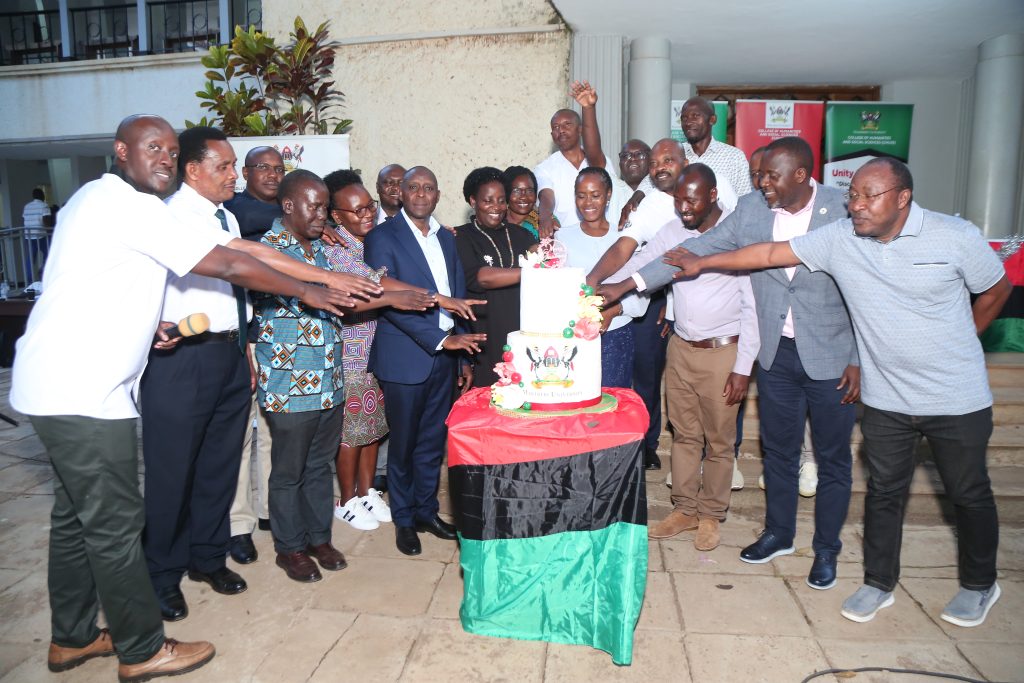
Five retired staff Dr. Micheal Wangotta Masakala, Dr. Anatole Kirigwajjo and Dr. Jackson Kizza Mukas (all from the School of Languages, Literature and Communication), Assoc. Prof. Florence Nansubuga (School of Psychology), Dr. Tusabe Gervase (School of Liberal and Perforing Arts) and Ms. Scovia Nganda Sekweyama (secretary from the School of Social Sciences) were recognised for their dedicated services to the university.
In addition to Dr. Pamela Khanakwa’s Award as Best PhD Supervisor and Dean, Ms. Birabwa Florence scooped the award of Best Registrar of the year. Birabwa is the registrar for the School of Liberal and Performing Arts.
Administrative and support staff including Ms. Mary Gyezaho and Annet Kashumbusha(both administrative secretaries in the Principals office), Farouq Lule (IT Officer), Godfrey Kakooza (cleaner), Charles Sebuguzi (driver) and Jane Anyango (Communications officer) were recognise with awards for outstanding service. Dr. Mohamed Mayanja Kajumba was from the School of Pyschology was recognised as the person with an outstanding talent in Handwriting.
The celebrations held in the Arts quadrangle were graced by the Vice Chancellor Academic Affairs Prof. Sarah Ssali and the Deputy Vice Chancellor in charge of Finance and Adminstration Prof. Ireeta Tumps.
Humanities & Social Sciences
Ugandan Journalists Trained on Peace and Gender-Sensitive Reporting Ahead of 2026 Elections
Published
1 month agoon
January 9, 2026By
Jane Anyango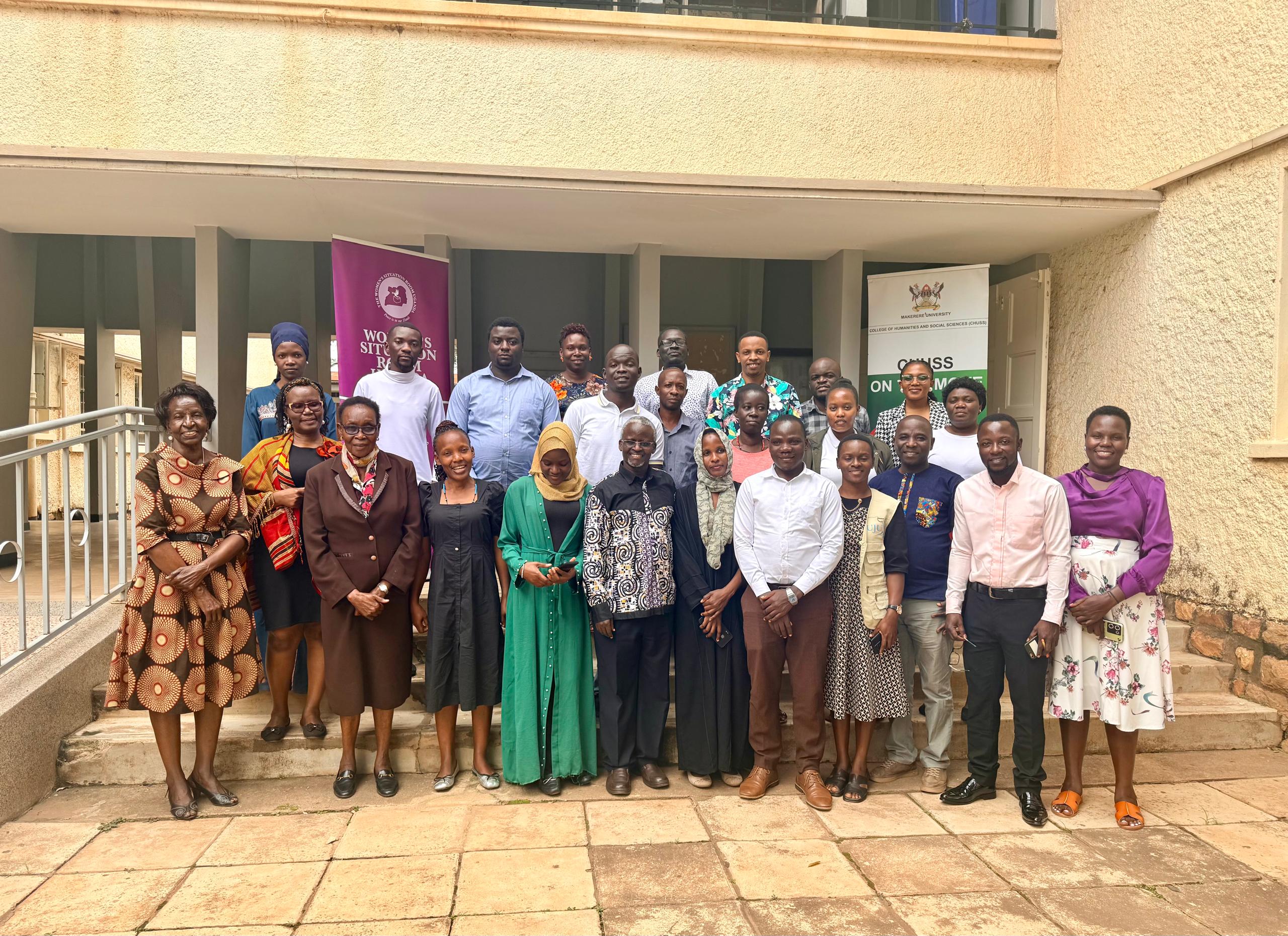
Kampala, Uganda – January 9, 2026
Ahead of the January 15 general elections, Ugandan journalists have undergone specialized training on peace and gender-sensitive reporting to ensure responsible media coverage during the election period. The two-day training, held from 8th to 9th January 2026 at Makerere University’s College of Humanities and Social Sciences Smart Room, was organized by the Women’s Situation Room (WSR) in partnership with various stakeholders and brought together journalists from across print, broadcast, and online platforms.
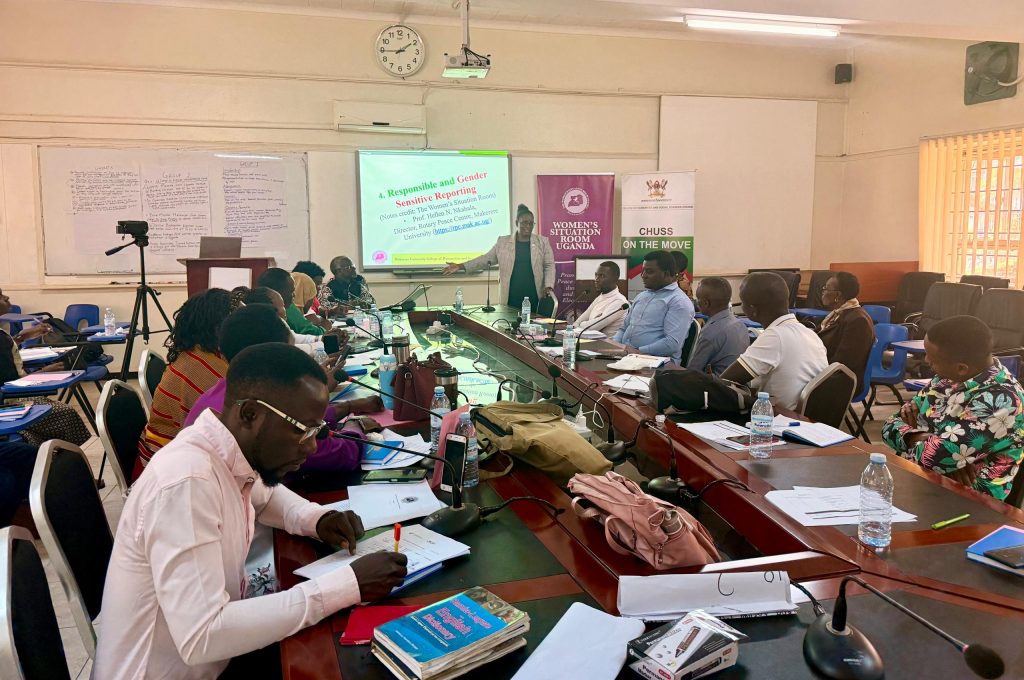
The main objective of the training was to strengthen the capacities of media in reporting and documenting electoral processes in a responsible and gender-sensitive manner. The specific objectives included: strengthening journalists’ skills to cover the 2026 elections in a fair, balanced, gender-sensitive, and non-violent partisan way; enhancing the role of media to enable citizens to be well-informed and actively participate in the election process; ensuring focused and balanced reporting on peace during and after elections; and strengthening partnerships between the WSR and media houses during the election period.
The training covered multiple critical modules. Day one focused on responsible conflict-sensitive reporting, emphasizing principles such as balance, impartiality, and accuracy. Participants explored the role of media as a relayer of the population’s voice, election monitor, catalyst for social cohesion and reconciliation, contributor to the accountability of political actors, and a platform for detecting and debunking digital media misinformation and hate speech.
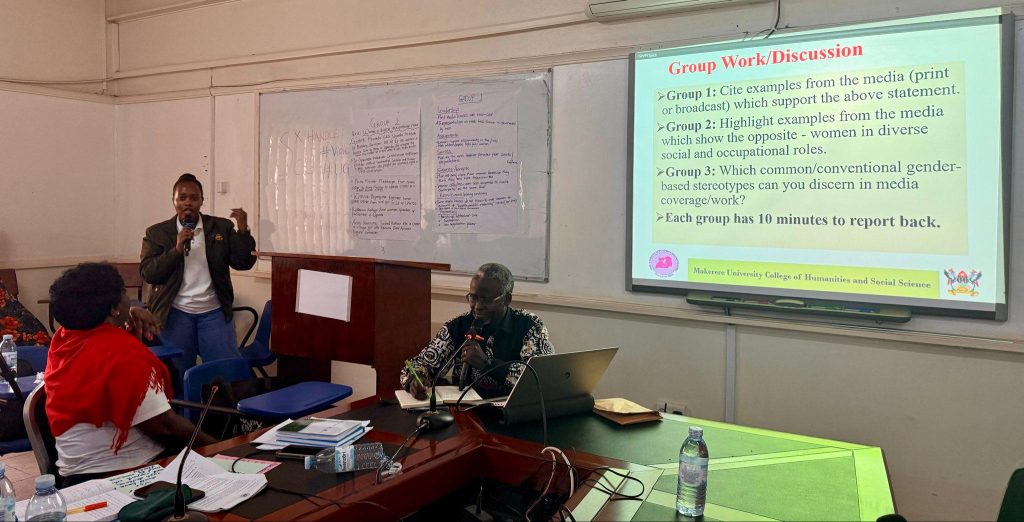
Day two addressed responsible and gender-sensitive reporting. Key aspects included the definition of gender-sensitive reporting, how to become a gender-sensitive reporter, critical elements in reporting with gender awareness, packaging gender-sensitive stories, and a checklist for detecting and avoiding gender-insensitive reporting.
Her Lordship, retired Judge Justice Mary Mayitum, emphasized the importance of peace as the foundation of development and democratic engagement. “Because we value peace more than anything. Without peace, really, you can do nothing. But where there is peace, you can have time to reflect, discuss with others, and join in meaningful dialogue,” she said. She warned that the country’s past conflicts, such as those in Gulu, underscored the necessity of maintaining national harmony.
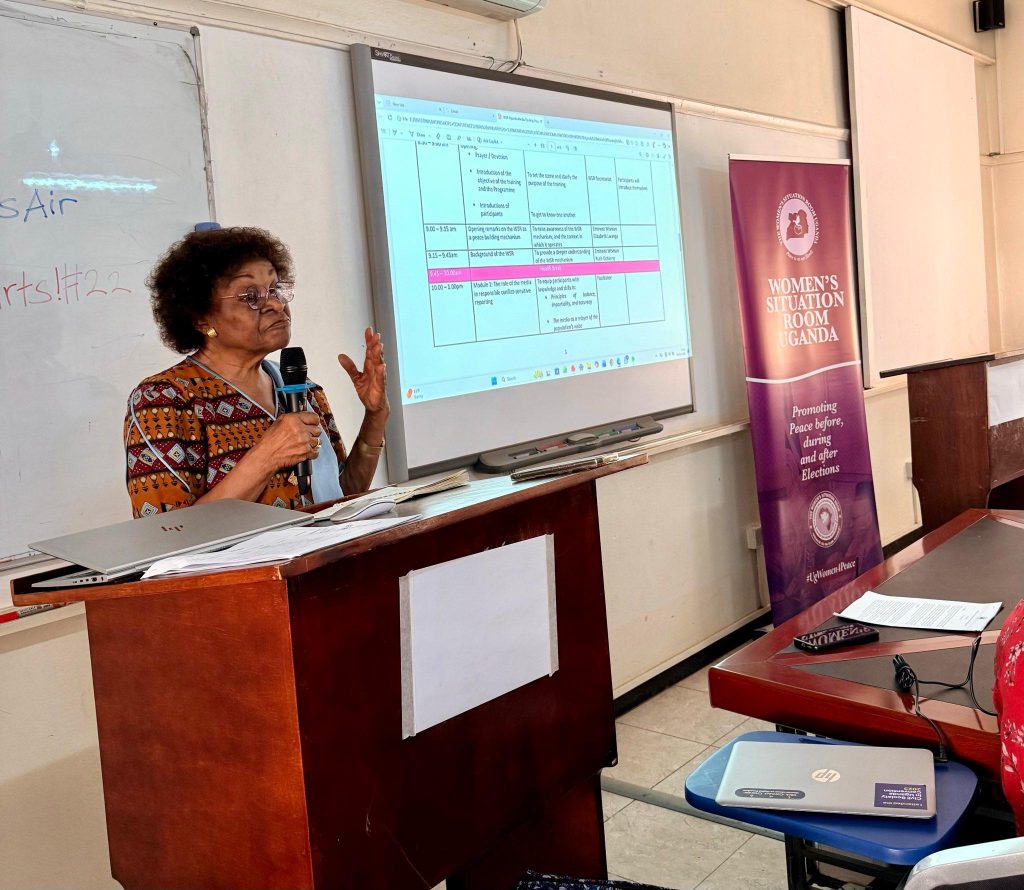
Justice Mayitum also urged other key election stakeholders to uphold peaceful conduct. “Being peaceful is the very heart of life. We have spoken to police, security personnel, political parties, and the Electoral Commission. We want politicians to have a code of conduct and to understand that it’s okay to think differently without fighting or hating one another,” she added.
Dr. William Tayebwa, lead facilitator and senior lecturer in the Department of Journalism and Communication at Makerere University, said, “This training is about conflict-sensitive reporting, peace journalism, and gender-sensitive reporting in the context of the elections. The emphasis was on giving female political candidates a voice while ensuring journalists report responsibly on election-related matters.”
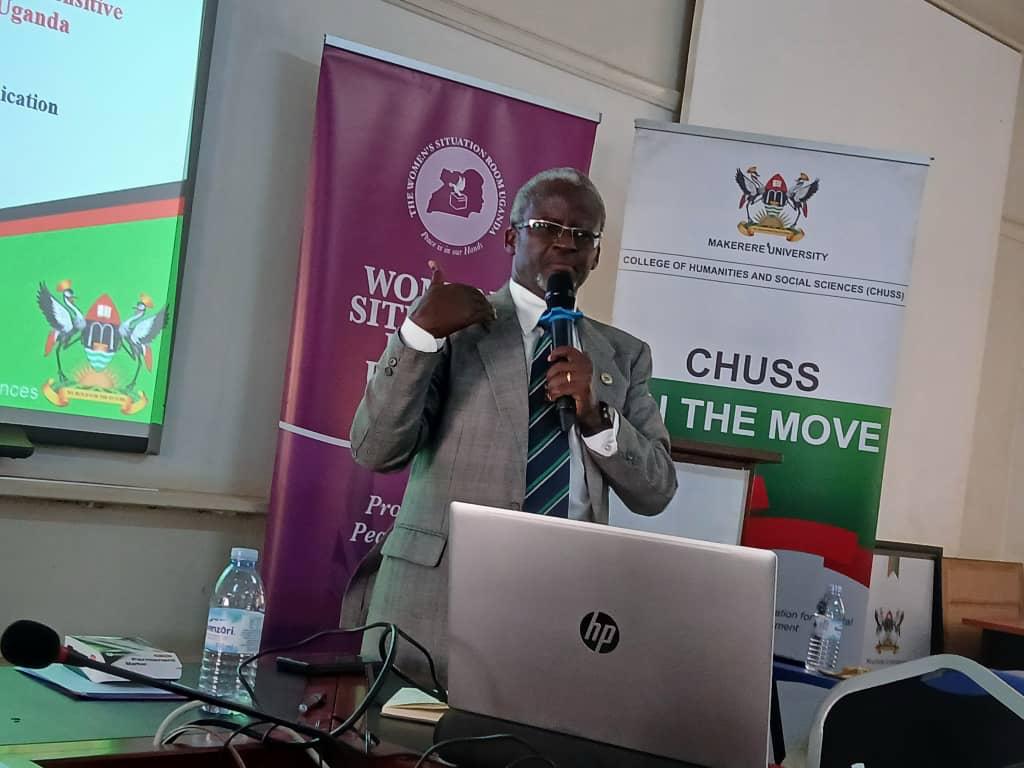
Participants described the training as timely and impactful. Tony Banizengabo of CBS Wakiso District said, “We’ve benefited a lot. We’ve been trained to write stories which bring peace, not conflict. Ahead of the elections, we are very ready to be part of peacemakers.”
Dorcas Kimono of UBC TV Kampala added, “It was so timely and rich. We learned how to report without promoting or fueling violence, giving voice to victims without angering them or encouraging violators. This is very vital, especially as we approach the 2026 elections.”
The training aims to equip media personnel with the knowledge and skills to uphold professional ethics while contributing to a peaceful, inclusive, and gender-sensitive electoral process.
Humanities & Social Sciences
CHUSS Invests Over UGX 100 Million in Interactive Smart Screens, Upgrades Teaching Infrastructure
Published
1 month agoon
January 9, 2026By
Jane Anyango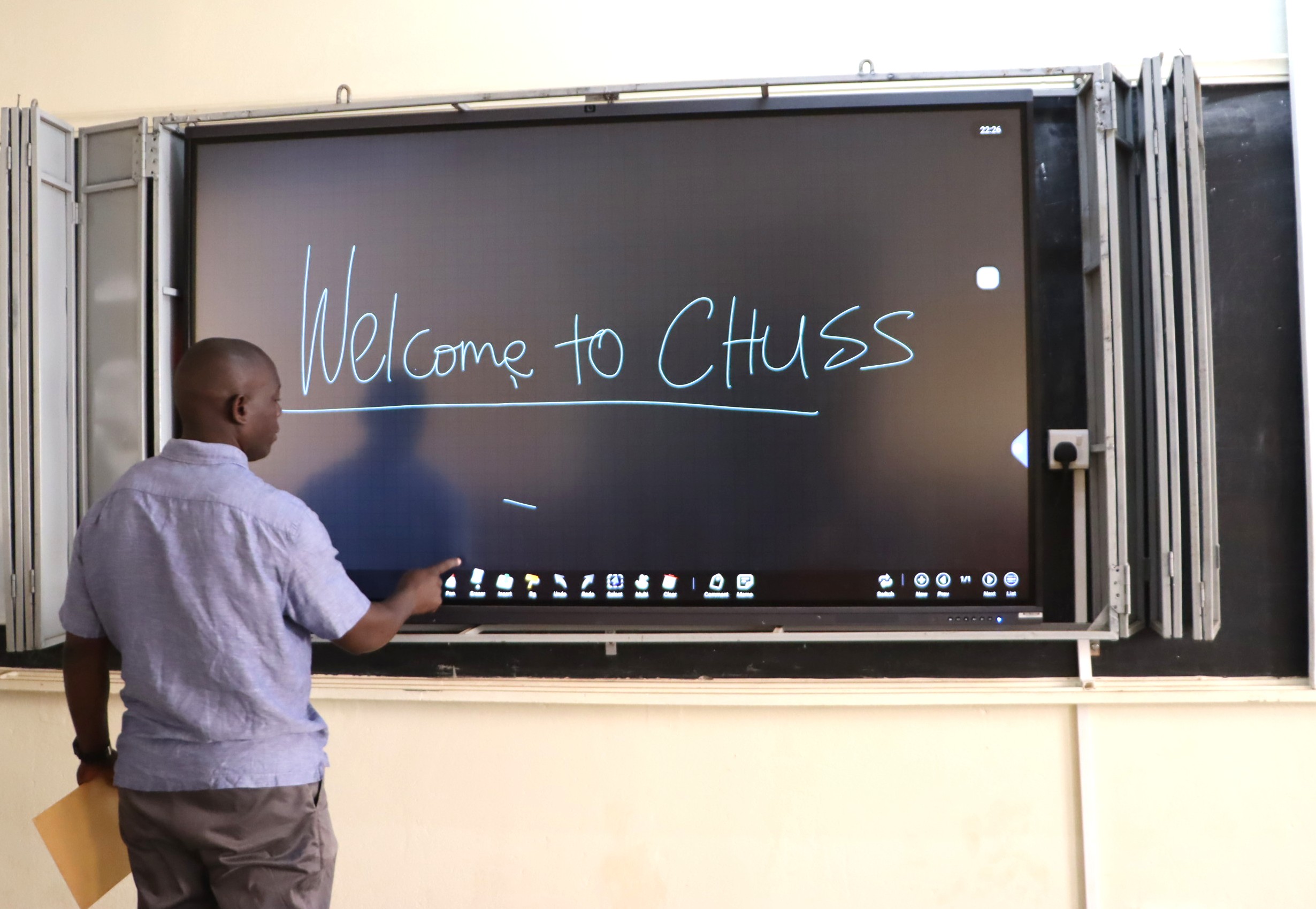
The College of Humanities and Social Sciences (CHUSS) has invested over UGX 100 million in the acquisition and installation of state-of-the-art interactive smart screens, marking a major step in strengthening digital teaching and learning at Makerere University.
Under the investment, 86-inch interactive 4K smart screens have been installed in major lecture rooms across the college’s schools, replacing traditional projectors and whiteboards. The upgrade is intended to modernise instructional delivery, enhance student engagement, and support blended and hybrid learning models.
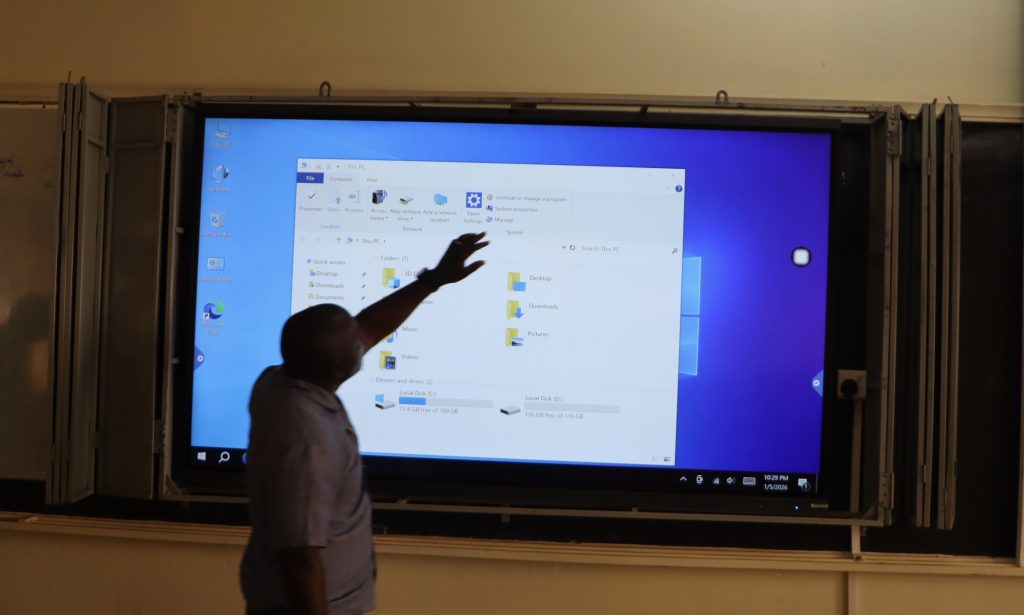
The touch-sensitive smart screens enable lecturers to write, draw, and annotate content directly on the display, while simultaneously integrating multimedia resources such as videos, presentations, and online materials. The screens support wireless screen casting from laptops, tablets, and smartphones, allowing for smooth, cable-free presentations and real-time sharing of students’ work during lectures and group discussions.
Designed to promote interactive and learner-centred pedagogy, the smart screens feature multi-touch capability that allows several users to interact with the board at the same time. This functionality supports collaborative learning, problem-solving exercises, and group presentations, making lessons more engaging and inclusive for students with diverse learning styles.
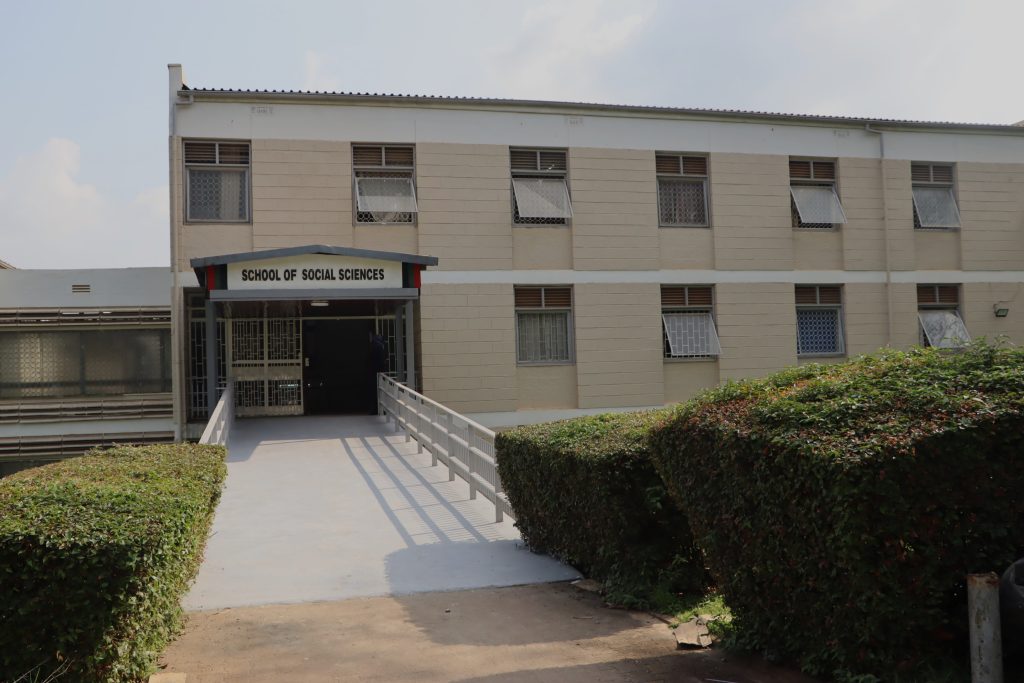
The boards are equipped with built-in cameras, microphones, and speakers, enabling seamless hybrid teaching through platforms such as Zoom, Microsoft Teams, and Google Meet. This allows lecturers to conduct virtual and physical classes simultaneously, record full lectures, and share them with students for later review, revision, or catch-up purposes.
Running on dual Android and Windows operating systems with full internet connectivity, the smart screens provide direct access to online academic resources, digital libraries, and learning management systems. Their AI-powered features further enhance lesson organisation, content clarity, and efficient, paper-free instruction, contributing to a more sustainable learning environment.
To ensure safety and prevent misuse, the smart screens are secured in fabricated metallic safety boxes installed in the lecture rooms.
Beyond digital infrastructure, CHUSS has also undertaken additional physical improvements. The Russian Lecture Room in the School of Languages, Literature and Communication has been furnished with new chairs, tables, and a projector screen, significantly enhancing its teaching environment.
The college has further improved staff working spaces, with the School of Psychology renovating office space and classrooms in Block A, while similar renovations have been carried out in the School of Social Sciences.
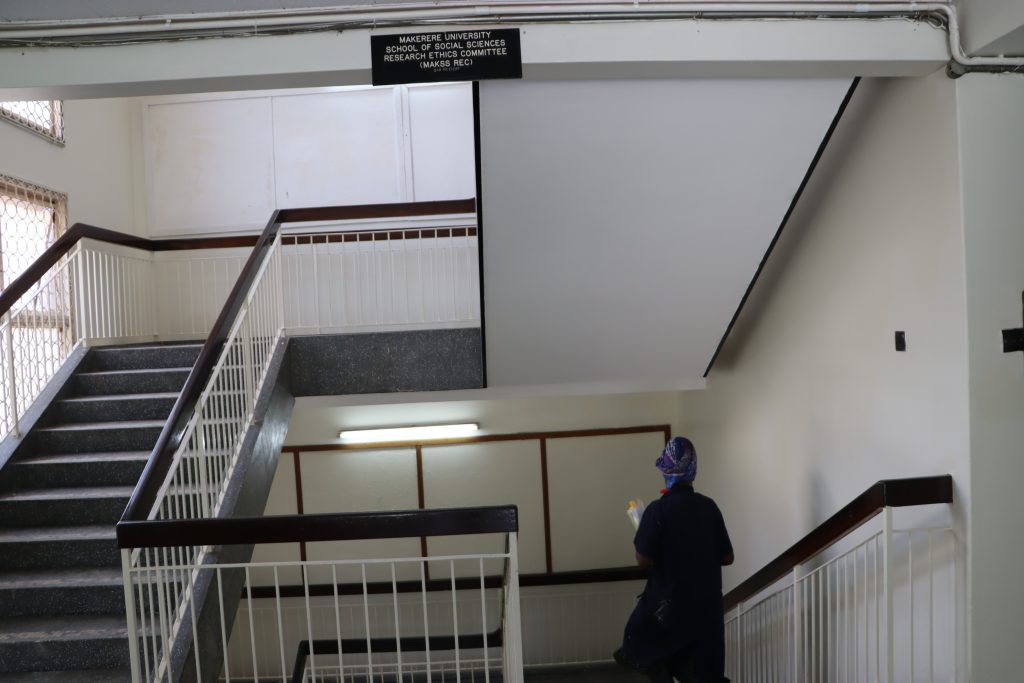
The infrastructural upgrades underscore CHUSS’ commitment to improving the quality of teaching, learning, and staff working conditions in line with Makerere University’s digital transformation agenda.
Trending
-

 Agriculture & Environment2 weeks ago
Agriculture & Environment2 weeks agoFrom Adversity to Excellence: The Inspiring Journey of Makerere’s Best Science Student, Esther Ziribaggwa
-

 General1 week ago
General1 week agoAptitude Exam (Paper 1) Results for the Mature Age Entry Scheme 2026/2027
-

 Health2 weeks ago
Health2 weeks agoDr. Samalie Namukose and the Quiet Work of Making Nutrition Count
-

 Research2 weeks ago
Research2 weeks agoCall for PhD Student Fellowships under H-DATA
-

 Health1 week ago
Health1 week agoHow Jimmy Osuret Turned Childhood Trauma into Evidence for Safer School Crossings
